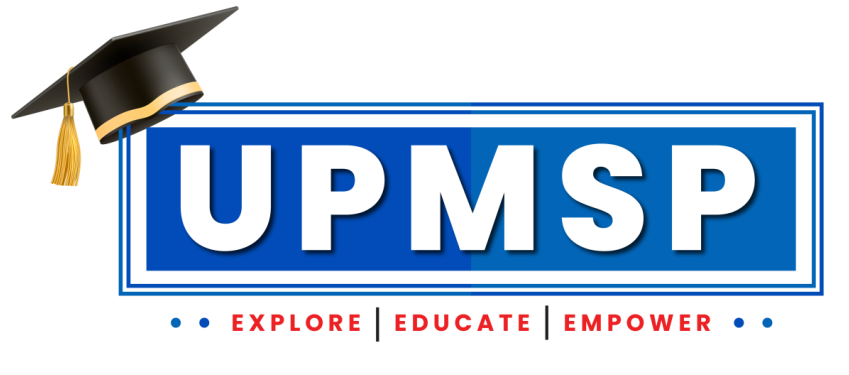Congratulations on passing your UP Board Exams! This significant milestone marks the end of your school journey and the exciting beginning of a new chapter – higher education. After 12th UP Board exams, whether you’re brimming with clarity about your future path or overwhelmed by the plethora of options, this blog is here to guide you through exploring higher education possibilities in India.
Career Options After UP Board Exams

The Indian education system offers a diverse range of academic avenues to pursue after your 12th board exams. Here’s a breakdown of some prominent pathways you can consider:
- Traditional Undergraduate Programs after UP Board Exam: This is the most common route after Class 12. Numerous universities and colleges across India offer undergraduate programs in various disciplines like Science (BSc), Arts (BA), Commerce (BCom), Engineering (BE/BTech), Management (BBA), Law (LLB), Medicine (MBBS), and many more. The duration of these programs typically ranges from three to five years.
- Professional Courses after UP Board: If you’re keen on acquiring job-specific skills, professional courses provide a focused and practical education. Examples include programs in Hotel Management, Fashion Design, Animation & Multimedia, Journalism & Mass Communication, and diplomas/certificates in specific technical fields after UP Board exams.
- Integrated Programs after UP Board Exam: These programs combine undergraduate and postgraduate degrees into a single, extended course. For instance, a Bachelor of Technology (BTech) followed by a Master of Technology (MTech) can be offered as an integrated program, saving you a year and is a great career option after UP Boards exams of class 12.
- Vocational Courses after UP Board Exam: After UP Boards if you are looking to save some money and enrol into a course then those class 12th pass outs should opt for vocational courses. Vocational training equips you with industry-relevant skills for specific occupations. ITI (Industrial Training Institutes) offer diplomas and certificates in various trades, while polytechnic institutes provide diploma programs with a stronger theoretical foundation.
- Higher Studies Abroad after UP Board: For all students seeking an international educational experience, numerous universities worldwide offer undergraduate programs to Indian students. Explore options in countries like the USA, UK, Canada, Australia, Singapore, and Germany. There are many career consultants services like Edwise International, Aara Consultants and many more that work with many universities across the globe to send students across the border for higher education.
Let’s delve into the details of the traditional undergraduate programs:
- Science (BSc): Bachelor of Science programs are designed for students inclined towards scientific inquiry and exploration. These programs offer specializations in disciplines such as Physics, Chemistry, Biology, Mathematics, Computer Science, and Environmental Science, among others. The duration of BSc programs typically ranges from three to four years.
- Arts (BA): Bachelor of Arts programs are ideal for students interested in humanities, social sciences, languages, and liberal arts. BA programs offer a wide range of subjects including History, Political Science, Economics, Sociology, Psychology, English Literature, and many more. The duration of BA programs usually spans three years.
- Commerce (BCom): Bachelor of Commerce programs cater to students aspiring for careers in business, finance, accounting, and related fields. BCom programs cover subjects like Accounting, Economics, Business Management, Finance, and Taxation. The duration of BCom programs typically ranges from three to four years.
- BCA (Bachelor of Computer Applications): BCA programs are tailored for students passionate about computer science and information technology. These programs provide comprehensive training in software development, programming languages, database management, networking, and web development. The duration of BCA programs is generally three years.
- B Pharma (Bachelor of Pharmacy): B Pharma programs are designed for students interested in the pharmaceutical industry and healthcare sector. These programs focus on pharmaceutical sciences, drug development, pharmacology, medicinal chemistry, and pharmacy practice. The duration of B Pharma programs is typically four years.
- BJMC (Bachelor of Journalism and Mass Communication): BJMC programs are suitable for students aspiring to pursue careers in journalism, media, and communication. These programs cover areas such as news reporting, editing, broadcasting, advertising, public relations, and media ethics. The duration of BJMC programs is usually three years.
- Engineering (BE/BTech): Bachelor of Engineering or Bachelor of Technology programs are highly sought-after by students interested in technology, innovation, and engineering disciplines. These programs offer specializations in branches like Mechanical Engineering, Civil Engineering, Electrical Engineering, Computer Science Engineering, Electronics and Communication Engineering, and more. The duration of BE/BTech programs typically spans four years.
- Management (BBA): Bachelor of Business Administration programs are designed for students aspiring to pursue careers in business management, administration, and entrepreneurship. BBA programs cover areas such as marketing, finance, human resource management, operations management, and strategic management. The duration of BBA programs is generally three years.
- Law (LLB): Bachelor of Laws programs are intended for students interested in legal studies and the legal profession. LLB programs provide a comprehensive understanding of law, legal systems, jurisprudence, and constitutional principles. The duration of LLB programs is typically three years for graduates and five years for undergraduates.
- Medicine (MBBS): Bachelor of Medicine, Bachelor of Surgery programs are aimed at students passionate about healthcare and medical practice. MBBS programs provide rigorous training in medical sciences, clinical skills, patient care, and healthcare ethics. The duration of MBBS programs is generally five and a half years, including a mandatory internship period.
The Right Path After Board Exams:
With so many options, choosing the right path can feel daunting. Here are some steps to navigate this crucial decision:
- Self-Assessment after UP Board Exams: Introspect on your interests, strengths, and learning preferences. What subjects did during your stay in UP Board? What kind of work environment do you envision yourself in? Are you academically inclined or drawn towards practical applications?
- Career Exploration: Research various career options that align with your interests. Talk to professionals in fields that pique your curiosity. You can also take career aptitude tests offered by educational institutions or online platforms for career explorations.
- Research Programs: Once you have a general direction in mind, delve deeper into specific programs. Consider factors like program curriculum, faculty expertise, placement opportunities, infrastructure, and alumni network. Shortlist universities/colleges that offer programs matching your aspirations.
- Entrance Exams after UP Board Exams: Many universities and colleges conduct entrance exams for admission into certain programs. Familiarize yourself with the entrance exams after UP Board: their format, syllabus, and important dates. Consider enrolling in coaching classes or taking online practice tests if needed.
What to do After 12th: Considering Other Important Aspects
Beyond academics, here are some additional factors to keep in mind while making your decision while choosing career path after UP Boards Exams:
- Financial Aid: Higher education comes with financial considerations. Explore scholarship options offered by the government, universities, or private institutions. Consider educational loans if necessary.
- Location: Do you prefer to study in your hometown, a different city, or even abroad? Consider the cost of living, accommodation options, and the overall environment of the place. Consider your limitation and take a wise decision after UP Board Exams.
- Personal Growth: Think beyond academics. Look for institutions that offer opportunities for extracurricular activities, personality development, and holistic learning.
Government Jobs and Vacancies to Apply in Uttar Pradesh and Other States
While higher education opens doors to diverse career paths, some students might be interested in pursuing government jobs after completing their 12th UP Board Exams. The good news is that there are indeed government openings for candidates with a Class 12 pass certificate from the UP Board or any other recognized board in India. Here are some avenues to explore:
- Central Government Jobs after UP Board: The Staff Selection Commission (SSC) conducts various exams throughout the year for recruitment to various positions in the central government departments. These include SSC Multi Tasking Staff (MTS), SSC Stenographer, SSC Combined Higher Secondary Level (CHSL) for positions like Lower Division Clerk (LDC), and SSC General Duty Constable (GD).
- Uttar Pradesh Government Jobs after UP Board: The Uttar Pradesh government conducts recruitment for various positions through agencies like Uttar Pradesh Public Service Commission (UPPSC) and Uttar Pradesh Subordinate Services Selection Commission (UPSSSC). These include opportunities in the UP Police department (Constable), UP Postal Circle (Postal Assistant), and UP Lekhpal (revenue administration).
- Indian Armed Forces Jobs after UP Board: If you’re passionate about serving the nation and possess a strong sense of discipline, the Indian Armed Forces offer a distinguished career path. Here’s how you can leverage your Class 12th UP Boards score for entry:
- National Defence Academy (NDA) & Naval Academy Examination: This prestigious exam is conducted by the UPSC twice a year for recruitment into the Army, Navy, and Air Force (after the first year of training). Candidates must be between 16.5 and 19.5 years old and have passed Class 12th with Mathematics and Physics in UP Boards subjects.
- Agnipath Scheme: This recently launched program by the Indian Armed Forces provides an opportunity for short-term service (4 years) followed by potential enrolment or civilian job placement. Eligibility criteria vary depending on the service branch, but a Class 12th pass certificate is a prerequisite.
Conclusion
Congratulations once again on conquering your UP Board Exams! This is a significant accomplishment, and the path forward is brimming with possibilities. Whether you choose to pursue higher education, land a government job, or embark on a different journey altogether, remember to embrace the learning process, stay true to your aspirations, and make the most of this exciting phase in your life. For students awaiting their results: check out our blog that is dedicated to the results for UP Boards Exams.
This blog serves as a stepping stone. There’s a vast world of education and career options waiting for you. Research extensively, seek guidance from mentors, and don’t be afraid to dream big. With dedication and a positive attitude, you can achieve remarkable things. All the best for your future endeavors after UP Boards Exams!
FAQ’s
Q. Which field is best for the future?
Yes, there are many exciting fields for the future! For Science students, consider Data Science, Artificial Intelligence, Robotics, Biotechnology, and Renewable Energy. Commerce students can explore Fintech, E-commerce, Digital Marketing, Business Analytics, and Sports Management.
Q. What are high-salary jobs after Class 12th in India?
While salary can vary depending on experience and location, here are some high-salary job titles achievable after Class 12th in India:
Science Stream:
Doctor (MBBS),Pilot,Software Engineer,Data Scientist,Machine Learning Engineer and Biotechnologist
Commerce Stream:
Chartered Accountant (CA),Investment Banker,Management Consultant,Data Analyst and Digital Marketing Manager
Government Jobs:
Indian Administrative Service (IAS) Officer,Indian Forest Service (IFS) Officer,Public Sector Undertaking (PSU) Engineer
Other Options:
Commercial Airline Pilot, and Merchant Navy Officer
Q. Does 12th marks matter in career?
Yes, 12th marks can matter in your career. They can impact eligibility for higher education and some jobs.




